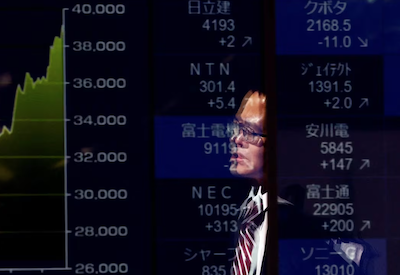Asia’s share indexes started the week on the back foot with traders waiting nervously on the latest key reading on US inflation that could hasten, or delay, the start of global rate cuts.
Chinese and Hong Kong stocks were the outliers after an upswing in consumer prices raised hopes of an economic recovery, and scotched recent fears of deflation.
But Japanese stocks fell as much as 3% in earlier trading as the yen strengthened against the dollar and semiconductor stocks suffered a sell-off.
Also on AF: Cranes at US Ports Pose No Security Risk: Shanghai Zhenhua
The Nikkei share average closed 2.19% down, or 868.45 points, to end at 38,820.49, while the broader Topix was down 2.20%, or 59.97 points, to 2,666.83.
Among the biggest losers were SoftBank Group, which fell 6.91%, while chip-testing equipment maker Advantest gave up 6.13% and Mizuho Financial Group dropped 5.60%.
Japanese semiconductor stocks have risen sharply in recent months on the back of bullish expectations for growth in demand for chips used for artificial intelligence technologies.
Last week the Nikkei broke 40,000 for the first time, having in February broken the record set just before Japan’s asset bubble burst in the early 1990s.
China stocks gained, however, after consumer prices rose for the first time in six months due to spending linked to the Lunar New Year, offering some reprieve for the world’s second-biggest economy grappling with weak consumer sentiment.
And during China’s parliamentary meeting, the government vowed to keep money supply and credit growth in step with the real GDP and inflation targets, signalling increased efforts to boost confidence.
China’s blue-chip CSI300 Index ended up 1.25% while the Shanghai Composite Index rose 0.74%, or 22.44 points, to 3,068.46. The Shenzhen Composite Index on China’s second exchange was ahead 2.12%, or 36.47 points, to 1,756.18.
China Vanke Support
Property shares rose after news that Chinese regulators asked large banks to enhance financing support to developer China Vanke and asked private debt holders to discuss maturity extension. Vanke shares rose 2% in Shanghai and gained 1.5% in Hong Kong.
Tech stocks led the Hong Kong market higher and the Hang Seng Index gained 1.43%, or 234.18 points, to 16,587.57. An index tracking technology stocks rose 2.6%.
Elsewhere across the region, in earlier trade, Sydney, Seoul, Singapore, Wellington, Mumbai, Bangkok, Taipei and Manila were all in negative territory. MSCI’s broadest index of Asia-Pacific shares outside Japan eased 0.16%, after hitting an eight-month peak on Friday.
Tuesday’s US consumer price index (CPI) report for February is forecast to rise 0.4% for the month and keep the annual pace steady at 3.1%. Core inflation is seen rising 0.3%, which will nudge the annual pace down to the lowest since early 2021 at 3.7%.
The slower core would complement the softer conditions seen in the February payrolls report, where unemployment hit a two-year high of 3.9%, and would keep the Federal Reserve on track to cut rates in the next few months.
Futures imply about a 25% chance of a Fed cut in May and 75% for a first move in June.
S&P 500 futures eased 0.05% and Nasdaq futures dipped 0.1%, having both run into profit taking on Friday as artificial intelligence diva Nvidia shed 5.6%. Eurostoxx 50 futures fell 0.6% and FTSE futures dipped 0.36%.
Treasury Bonds Rally
Treasury bonds continued their rally after the benign jobs report with 10-year yields touching a one-month low of 4.038% and last trading at 4.0672%.
The drop in yields has undermined the dollar, especially against the yen given market speculation that the BOJ will end its negative rate policy (NIRP) and yield curve control (YCC) this month.
The dollar was off at 146.98 yen, having shed 2% last week to a five-week low of 146.48. The euro was holding firm at $1.09395, after bouncing 0.9% last week to as high as $1.0980.
The decline in the dollar and bond yields has been supportive of non-yielding gold which was up at $2,177.58 an ounce, having surged 4.5% last week to record peaks.
Oil prices have had a tougher time as worries about China’s demand offset supply cuts by producer group OPEC+. Brent dipped 43 cents to $81.65 a barrel, while US crude lost 48 cents to $77.53 per barrel.
Key figures
Tokyo – Nikkei 225 < DOWN 2.19% at 38,820.49 (close)
Hong Kong – Hang Seng Index > UP 1.43% at 16,587.57 (close)
Shanghai – Composite > UP 0.74% at 3,068.46 (close)
London – FTSE 100 < DOWN 0.27% at 7,639.08 (0933 GMT)
New York – Dow < DOWN 0.18% at 38,722.69 (Friday close)
- Reuters with additional editing by Sean O’Meara
Read more:
China’s Consumer Prices Rise For the First Time in Six Months
Japan ‘Not Planning’ to Widen China Chip Curbs Despite US Push
India in $100 billion Investment Deal With Europe Trade Group
Hang Seng Boosted by Tech, Profit-Taking Caps Nikkei Gains
























